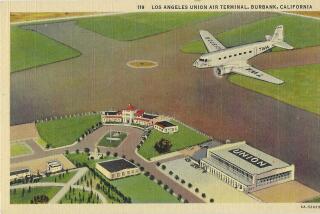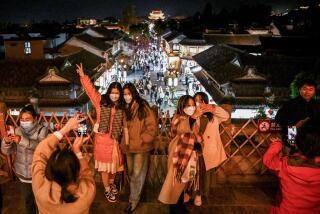Isolated Wuhai Sprouts Wings
- Share via
WUHAI, China — Before the little building rose, everything was simpler. Outsiders pretty much stayed out. Insiders traded with each other. Miners mined coal. Desert winds blew, nomads wandered, lonely lakes froze and thawed, and the town called Wuhai went about its business.
Which wasn’t very much business at all.
Sixteen hours from Beijing -- and that was by train. A car trip through Inner Mongolia’s grasslands and cracked desert could be even longer. Wuhai felt isolated: China was modernizing, city by city, and it was hard for this place to be heard in the din.
“There really weren’t that many ways to get to Wuhai,” said Jiang Jun, who works for the city’s Foreign Affairs Office.
That all changed one chilly day in December on a patch of land eight miles east of town when Wuhai threw its runway open for business. The thrice-weekly Hainan Airlines Flight HU857 from Beijing -- a 27-seat Dornier that bounces alarmingly in the wind -- touched down and disgorged a planeload of visitors, businessmen and potential investors who could connect Wuhai to the outside.
Suddenly, the long-overlooked Mongolian coal town and its 420,000 people -- a tiny city by Chinese standards -- were right on message for modern China’s market-economy ambitions: Bring in money and entrepreneurs. Hook up to the world. Help build the well-off society that the new leaders in Beijing demand.
“We’ll be bigger. We’ll be more dynamic,” said Wang Jiaqi, who lives in Xingdi, a village barely a mile from the end of the runway. “I can understand why not many people have come. But now they can.”
Added village leader Feng Shiming: “Before we become part of this globalized world, we have to be able to get to it.”
These days, a drive around Wuhai reveals a place poised to happen. Its freshly paved central plaza features a flagpole but no flag. Buildings by the dozen, including a convention center, are rising. Businessmen cluster at neon-saturated restaurants and scarf mutton dishes, mobile phones at their elbows. “Serve the local economy,” says a government sign on a building.
But serving the local economy, and bringing the world in, aren’t always easy in Chinese towns.
Unlike the United States or Europe, much of China’s countryside -- where 800 million of its residents live -- lacks paved highways. Although the government is hurrying to build more, expressways often taper off into two lanes at the edge of town, and entire regions are still connected by dirt roads.
At the same time, fierce competition among regions and aggressive local protectionism means that communities are scratching for any advantages that can attract investors. One northeastern city, Suifenhe, is hurrying to upgrade its port facilities and connect its roads to the outside world. Others are working to step up trade with Russia and North Korea.
Healthy trade is difficult, though, if there’s no way to get here from there -- particularly from the cash-laden business centers of China’s eastern seaboard. It takes airplanes.
Wuhai’s quest for an airport began in 1993 when the local government commissioned a study on whether it was worth the trouble. They decided it was.
“Look at the hours it saves. All kinds of links and communications are created by this one building and runway,” said Dang Wenyu, Wuhai’s top development official.
The facility that opened in December has two departure gates, marble walls, a tiny VIP lounge and a ship’s wheel in the lobby inscribed with a quotation from Mao Tse-tung, founding father of the Chinese communist state: “To sail upon a great ocean, much depends on the navigator.”
The navigator is the airport’s deputy executive, Zhang Jingchuan, an eager man in a blue micro-fiber suit who manages its 47 workers. He stands at the wind-swept runway’s edge and grins, his hair blowing wildly toward town as he gestures proudly to the sky. “This is where they come,” he said. “Like the rest of China, we’re in the midst of figuring out how we’re going to change.”
Wuhai was a scrub desert village and way station for the region’s nomads until 1976 brought the discovery of coal. Today there are 10 mines, and the landscape just southwest of town tapers off into a barren, industrial stretch of slag and sand. At the Wuhai Coking factory, railroad cars filled with coal rumble by slowly -- a fact that doesn’t go unnoticed by its manager, Liu Zhicheng.
“People have a lot of choices, and the airplane lets them choose Wuhai more easily,” he said.
Surrounding the town are farmers and their villages. Many grow potatoes that, locals say, are supplied to the Chinese company under contract to cut French fries for China’s hundreds of McDonald’s.
The flights, which this summer will become daily, are usually full. It takes just over three hours to get here from Beijing, with a stop in Hohhot, the regional capital, and a final hour over a cracked, carmine moonscape that reminds travelers of how tiny human beings really are.
When the flight arrives, the airport swings into action. Its 27 parking spaces fill up; its departure lounge grows noisy. Boarding announcements in Chinese and English interrupt a background-music medley of Beethoven’s Fifth and “Love Me Tender.”
In short, a portal to the world beyond Wuhai’s edge.
“This was the middle of nowhere. But I had to come here for work,” said Cao Yin, a Beijing businessman awaiting his flight home one afternoon. “If a place wants to develop, it has to be able to bring the people in to help it develop.”
More than 2,000 new people came in and out of Wuhai during the first three months of the airport’s operation -- hardly an explosion of trade. Gate 2 sits unused, but this summer, flights are being inaugurated to two nearby cities, Xi’an and Lanzhou, which authorities expect will double Wuhai’s traffic.
And in the sands northwest of town, brown-brick houses are rising -- Wuhai’s very first suburbs. Local officials hope that they’ll be populated with people who come through the airport to do business and decide to stay. The future, they say, is like China’s itself -- filled with potential.
All because of the little building and runway.
“Now we can say, ‘Come to Wuhai,’ ” said Zhang, the airport official. “And when they say it’s too complicated, we can say, ‘Just get on a plane.’ ”
More to Read
Sign up for Essential California
The most important California stories and recommendations in your inbox every morning.
You may occasionally receive promotional content from the Los Angeles Times.













